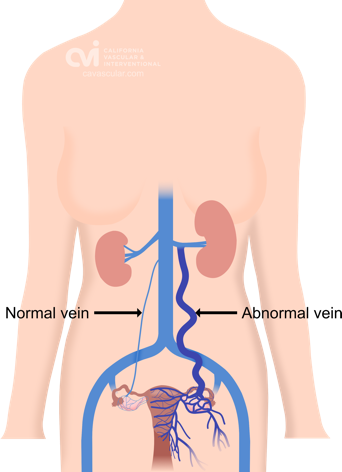
Virtual remote appointments are available. Contact us for a video telehealth evaluation.

All appointments conducted by our Board Certified doctor and not assistants or non-physician providers.
Pelvic congestion syndrome (PCS) is a condition characterized by chronic pelvic pain due to the engorgement of pelvic veins. Emerging research suggests a potential link between pelvic congestion and fertility issues.
Pelvic Congestion and Fertility:
Understanding Pelvic Congestion Syndrome:
Pelvic congestion syndrome involves the pooling of blood in the pelvic veins, leading to dilation and engorgement. While it's primarily associated with chronic pelvic pain, recent studies have begun to investigate its impact on fertility. The mechanism is not fully understood, but it's theorized that venous congestion might disrupt normal pelvic anatomy and function.1
PCS Effects on Ovulatory Function:
Pelvic congestion may interfere with normal ovulatory function. The altered hemodynamics and increased pressure in pelvic veins might disrupt the delicate hormonal balance necessary for regular ovulation. Studies have indicated that women with PCS may experience irregular menstrual cycles, which can contribute to fertility challenges.2

Impact on Fallopian Tubes and Uterine Blood Flow:
Disruption of Fallopian Tube Function:
Pelvic congestion may affect the fallopian tubes, essential for the transport of eggs from the ovaries to the uterus. Engorged veins might cause mechanical compression or alter the microenvironment, potentially hindering the normal function of the fallopian tubes. This interference could reduce the chances of fertilization and implantation.3
Uterine Blood Flow and Implantation:
The increased pressure in pelvic veins can affect uterine blood flow. Adequate blood supply is crucial for a healthy uterine lining, where a fertilized egg implants and grows. Disturbances in blood flow may compromise the endometrium, impacting implantation and early embryonic development.4
Pelvic Congestion Syndrome and Infertility:
Association with Unexplained Infertility:
Pelvic congestion has been observed in some cases of unexplained infertility. When routine fertility assessments yield no conclusive results, investigating the pelvic vasculature, especially in the presence of chronic pelvic pain, may offer insights into potential causes of infertility.5
Impact on In Vitro Fertilization (IVF) Outcomes:
Studies have explored the relationship between PCS and outcomes of assisted reproductive technologies. Elevated pelvic vein pressure and compromised blood flow may negatively influence the success of IVF procedures. Addressing pelvic congestion before embarking on fertility treatments like IVF may improve the chances of success.6
Treatment Options for Pelvic Congestion Syndrome:
Conservative Management:
Conservative approaches for managing pelvic congestion syndrome include lifestyle modifications, pain management, and hormonal therapies. While these methods may alleviate symptoms, they might not directly address fertility concerns associated with the condition.
Non-Surgical Pelvic Embolization:
Pelvic vein embolization is an interventional radiological procedure that has shown promise in the management of PCS. This procedure is not performed by a surgeon or an OBGYN. It involves the insertion of a catheter into the affected veins, and under x-ray guidance foam and embolic agents are deployed to block the abnormal blood flow. This minimally invasive procedure aims to alleviate symptoms by eliminating venous congestion.7
This outpatient procedure is typically one hour with a one-day downtime. Patients go home with just a Band-Aid. Read more about it here.
Improvement in Fertility After PCS Embolization:
Limited studies suggest that pelvic vein embolization may lead to improvements in fertility outcomes for some women with PCS. By addressing the underlying venous congestion, this procedure might create a more favorable environment for conception and implantation.8
Pelvic congestion syndrome, though primarily associated with pelvic pain, may have implications for fertility. The link between PCS and fertility is an area of ongoing research, and the role of embolization in improving fertility outcomes is a promising avenue. Addressing pelvic congestion through embolization offers a minimally invasive approach that may not only alleviate symptoms but also potentially enhance fertility in affected individuals.
If you are experiencing chronic pelvic pain and fertility issues consult our doctor to review your medical records to see if you are a good candidate for the embolization treatment.
Appointments are available via an online video telehealth platform or in person at one of the offices in Los Angeles, Orange County or San Diego, depending on the doctor’s availability. Contact Us Today. Why should you choose us? Read here.
References:
- Beard RW, Reginald PW, Wadsworth J. Clinical features of women with chronic lower abdominal pain and pelvic congestion. Br J Obstet Gynaecol. 1988;95(2):153-161.
- Soysal ME, Soysal S, Vicdan K. Ovulatory dysfunction in chronic pelvic pain patients with uterine myoma and myoma pseudocapsule: effect of myomectomy. Am J Obstet Gynecol. 2001;185(3):592-595.
- Varela C, Acosta AA, Haimovici F, Arechavaleta-Velasco F, Krupitzky H, Gadow EC. Microsurgical anatomy of the utero-ovarian veins: a preliminary study. Fertil Steril. 1993;60(3):452-456.
- Paulson RJ, Collins MG, Yankov VI. Prognosis for clinical pregnancy and delivery after sonographic demonstration of an intrauterine fluid collection. Fertil Steril. 1996;65(5):1145-1148.
- Hoppe K, Raabe-Oetker A, Klapdor R. [Pelvic congestion syndrome – a significant cause of chronic pelvic pain in women]. Zentralbl Gynakol. 1998;120(9):485-491. (Article in German)
- Hobbs JT. The pelvic congestion syndrome. Br J Hosp Med. 1990;43(1):54-58.
- Chung MH, Huh CY. Pelvic congestion syndrome: diagnostic and treatment role of interventional radiology. J Korean Med Sci. 2003;18(2):255-259.
- Venbrux AC, Chang AH, Kim HS, Montague BJ, Hebert JB, Arepally A. Pelvic congestion syndrome (pelvic venous incompetence): impact of ovarian and internal iliac vein embolotherapy on menstrual cycle and chronic pelvic pain. J Vasc Interv Radiol. 2002;13(2 Pt 1):171-178.
Contact us today to setup a consultation
